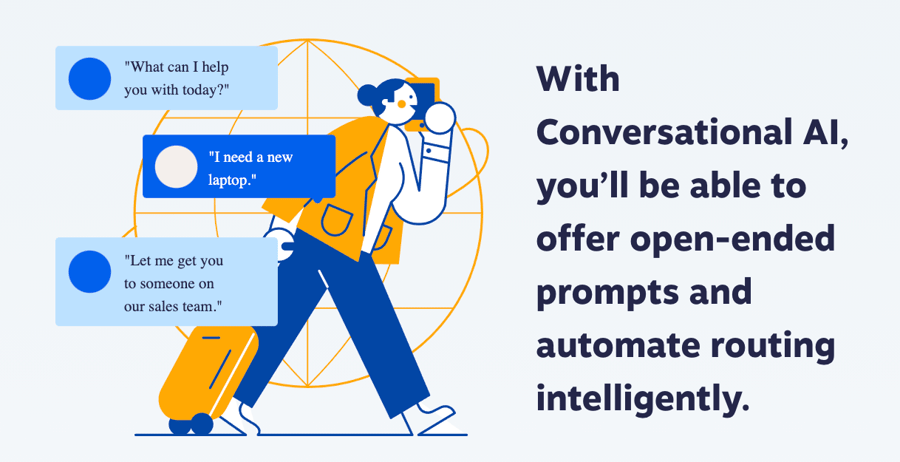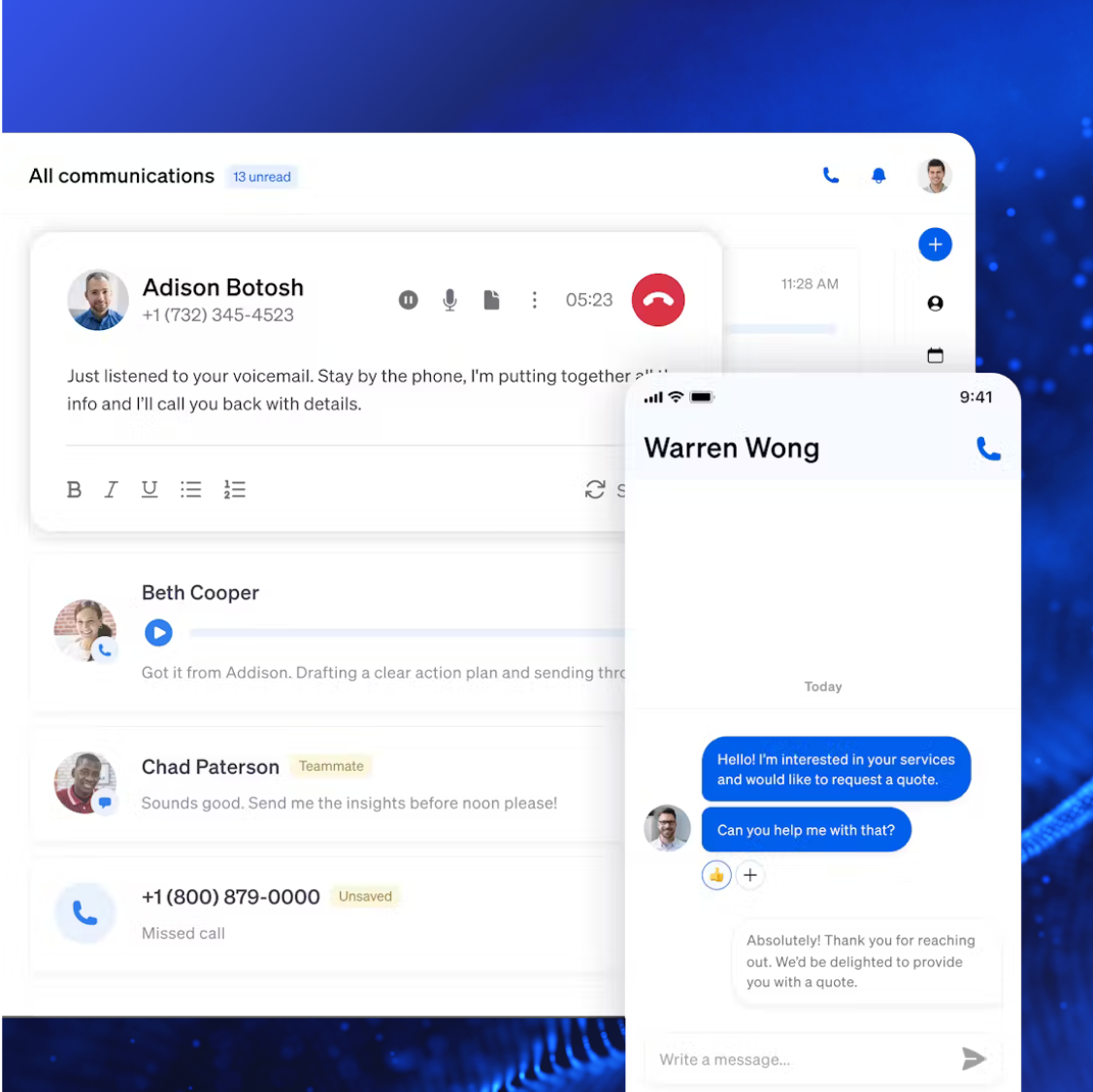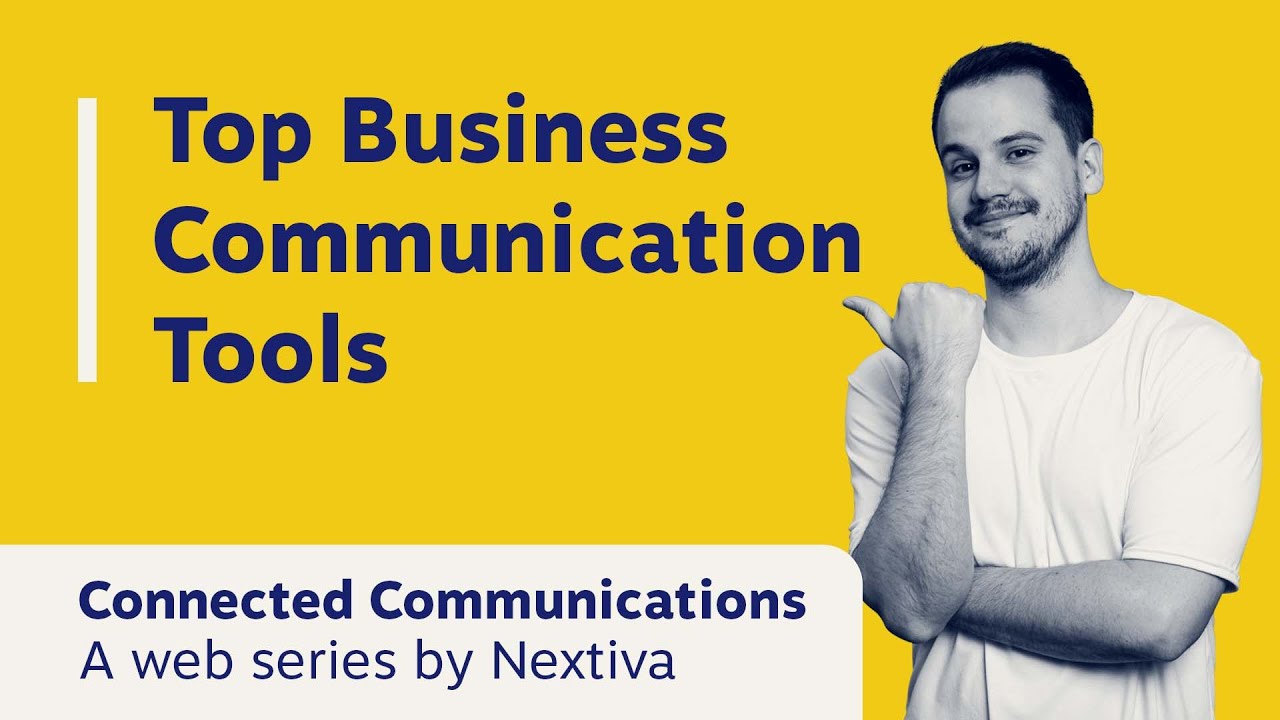| What are customer engagement tools? Customer engagement tools help companies interact with people after completing a sale, providing support, and driving account renewals. It’s where employees can keep track of customer history. |
Going the extra mile in customer service is standard practice. Customers expect a stellar customer experience (CX) every time they interact with your brand. If they don’t get intuitive, frictionless, and personalized experiences from you, they will turn to a competitor who will.
Positive, engaging interactions can encourage customers to stick around longer, which increases retention and revenue. Our guide to the best customer engagement tools can help you pick the right solution to improve customer satisfaction, boost retention, and increase revenue.
See what Nextiva can do for your CX
Short on time? Experience our AI-powered contact center in minutes through quick, on-demand demos.
How to Choose the Right Customer Engagement Tool
Not all user engagement tools are alike. You need a tool that helps you understand your customers’ behaviors while allowing you to adapt strategies on the fly. A tool that helps manage CX in multiple ways will have long-term relevance, giving you forward-thinking insights and helping future-proof your CX strategy.

The best customer engagement management tools have:
- Seamless integrations to mesh with your existing business systems
- Professional onboarding to quickly adopt and leverage the tool’s full capabilities
- Omnichannel support for frictionless communication across channels like email, live chat, and social media
- Personalization capabilities to adapt to customer behavior, preferences, and history
- Detailed data analytics and insights to make data-driven decisions that enhance engagement
- Automation and AI to streamline processes like personalized messaging and routing
- Scalability and flexibility to accommodate growing business needs and adapt to changing engagement trends
Together, these qualities help free up internal resources for more meaningful customer interactions. Think about it: If an intelligent virtual agent handles customer engagement at lower-priority touchpoints, your team has more bandwidth to address high-priority tasks and solve more complex problems.
1. Nextiva
Best overall customer engagement tool
G2 rating: 4.5

Nextiva is AI-driven customer engagement management software that facilitates seamless, personalized customer interactions on every channel. It offers a full suite of business communication tools to boost customer engagement, from Voice over Internet Protocol (VoIP) phone service to full CRM (customer relationship management) integration.
With data-driven insights from all your customer touchpoints, you can determine:
- Where your customers are engaging the least
- Which pages your customers read before buying
- What customers do when your proactive chat appears
Fostering engagement and building relationships is key to survival, no matter how big your business is. With engagement insights, you can see where you’re falling short on that mark and what you need to fix.
Features
Nextiva has all the right features to help you increase customer engagement, such as:
- Unified communications to streamline communications across multiple channels into one convenient dashboard
- Advanced customer analytics that gives you details into team performance and specifics on customer interactions
- Built-in video conferencing for seamless cross-team collaboration and file-sharing, ensuring everyone has the information they need
Plus, with Nextiva, you have the peace of mind that 24/7 customer support and data encryption can offer.

Pricing
Nextiva offers a wide range of pricing options depending on your desired features, the number of seats you need, and your preferred payment terms.
- Essential: $18.95 per user per month, billed annually
- Professional: $22.95 per user per month, billed annually
- Enterprise: $32.95 per user per month, billed annually
The Professional and Enterprise plans also feature mobile SMS and MMS messaging, plus unlimited conference calls.
 Pros
Pros
Detailed customer insights
Third-party integrations
Comprehensive reporting dashboards
Unlimited voice and video calls and faxes
 Cons
Cons
Live support limitations
Not suitable for companies outside of the US
2. LiveChat
Best for live agent customer service
G2 rating: 4.5

LiveChat is a live chat software solution with a chat widget that you can add to your website. It allows your users to interact with customer service reps or sales representatives.
Features
LiveChat helps manage your customer conversations with features such as:
- Customizable chat widget for a consistent, familiar experience on all devices
- Detailed reports and analytics to review customer satisfaction and chatbot performance, including missed and abandoned chats
- Omnichannel support across communication channels like SMS, WhatsApp, and Facebook Messenger
Notably, LiveChat’s starter package only keeps a 60-day chat history. If your customer tickets are ever open for that long or longer, you may lose access to valuable conversation context.
Pricing
LiveChat offers three main pricing tiers depending on how many monthly visitors you want to track:
- Starter: $20 per person per month, billed annually (limit to one seat) for tracking up to 100 monthly visitors
- Team: $41 per person per month, billed annually for tracking up to 400 monthly visitors
- Business: $59 per person per month, billed annually for tracking up to 1,000 monthly visitors
If you need greater tracking capabilities or prefer a dedicated account manager, you can also opt for LiveChat’s Enterprise package.
 Pros
Pros
High-quality live chat support
User-friendly interface
Third-party integrations
 Cons
Cons
Lack of notification options if the customer forgets the chat
Limited number of live chat agents
3. Typeform
Best for customer surveys and data collection
G2 rating: 4.5

Typeform is a customer engagement platform that changes data collection into an interactive experience. The software presents questions one at a time in a conversational style, increasing response rates. With AI-powered assistance, users can optimize forms and analyze data for insights, supported by analytics on performance metrics. Typeform is suitable for tasks like customer feedback, lead generation, and market research, providing businesses with tools to make decisions.
Features
A few of Typeform’s top features include:
- Conversational forms allow you to ask one question at a time, creating a conversational flow.
- Customizable forms that let you tailor colors, logos, and fonts for a cohesive and professional brand appearance.
- Integration capabilities with third-party tools like Google Sheets, Slack, Salesforce, and HubSpot.
With Typeform’s free trial, you can gain access to unlimited forms and more than 3,000 templates to get started.
Pricing
Typeform has four core plans to choose from:
- Basic: $25 per user per month, billed annually (limit to one seat) for tracking up to 100 monthly responses
- Plus: $50 per user per month, billed annually (limit to one seat) for tracking up to 1000 monthly responses
- Business: $83 per user per month, billed annually (limit to one seat) for tracking up to 10,000 monthly responses
- Enterprise: contact Typeform
- Growth Essentials: $166 per user per month, billed annually (limit to three seats) for tracking 1000+ monthly responses
- Growth Pro: $291 per user per month, billed annually (limit to five seats) for tracking 10,000+ monthly responses
- Growth Custom: Contact Typeform
Typeform recommends its Growth plans for advanced features.
 Pros
Pros
Ease of use
Ease of creation
Customizability
 Cons
Cons
Pricing
Survey issues
Learning curve
4. Sprout Social
Best for social media engagement
G2 rating: 4.4
Sprout Social is a customer engagement platform that helps businesses manage and optimize their social media presence. It consolidates social media messages into a single inbox, enables social listening to track interactions, mentions, and trends, and offers customer engagement tools like a publishing calendar for scheduling content.
The platform provides advanced features like performance analytics, AI-powered automation, crisis management, and review monitoring to improve workflows and brand reputation. Team collaboration tools support communication and task management among team members.
Features
Sprout Social offers these notable features:
- Shared inbox that centralizes all social media messages into one place, making it easier to manage and respond to inquiries across platforms.
- Publishing calendar helps customer service teams plan and schedule social media content in advance.
- Analytics and reporting provide data on social media performance, including engagement metrics, audience demographics, and campaign outcomes.
Advanced features are offered in their Advanced pricing tier.
Pricing
Sprout Social’s pricing tiers include:
- Standard: $199 per seat per month, billed annually
- Professional: $299 per seat per month, billed annually
- Advanced: $399 per seat per month, billed annually
- Enterprise: Contact Sprout Social for customized pricing
Sprout Social also offers a free 30-day trial so you can test out its features.
 Pros
Pros
Social listening
Social media management
Post scheduling capabilities
 Cons
Cons
Missing features
Pricing
Some scheduling issues
5. SurveyMonkey
Best for collecting and analyzing customer feedback
G2 rating: 4.4

SurveyMonkey is a survey platform that helps you create surveys to gather respondent feedback. It offers more than 250 survey templates, plus over 100 third-party integrations and the ability to distribute surveys across nearly every channel.
Features
SurveyMonkey offers several features to pique customer engagement, including:
- AI-powered guidance that allows for faster survey questions and unique recommendations to avoid response bias.
- Targeted questions that trigger based on the user’s time on the page, pages viewed, or visit frequency.
- Skip logic to add or remove survey questions based on the responses given by the user.
In addition to creating and distributing surveys, SurveyMonkey can help you analyze responses and generate reports summarizing them.
Pricing
If you’re a solopreneur or have a very small team with no need to share control of surveys and data, you might opt for an individual plan. But if you want to take advantage of survey sharing with different team members, SurveyMonkey offers two Team Plans that start at three users per plan:
- Team Advantage: $25 per user per month, billed annually
- Team Premier: $75 per user per month, billed annually
- Enterprise: Contact SurveyMonkey for pricing
If your needs balloon in the future, SurveyMonkey also offers enterprise plans for large businesses.
 Pros
Pros
User-friendly interface
Extensive survey templates
Survey customization capabilities
Third-party integrations
 Cons
Cons
No free trial period
Limited customer support
6. Drift
Best for creating customer communication strategies
G2 rating: 4.4

Drift (now, Salesloft) is a customer engagement platform that focuses on improving marketing and sales through conversational artificial intelligence (AI). It offers a chatbot feature that you can use to engage with website visitors in real time, answer questions, qualify leads, and schedule appointments.

Features
Drift has some great features to help boost customer engagement, like:
- Playbook functions have out-of-the-box automations for inbound and outbound customer communications.
- Machine learning analyzes user behavior to develop high-converting communication strategies.
- Trainable AI that can analyze your trusted knowledge sources for brand and messaging consistency.
It also offers email automation and analytics tools to help you personalize your customer interactions.
Pricing
Drift has only one price package for small businesses:
- Advanced: Contact Drift
- Premier: Contact Drift
If your business is larger or needs more complex insights and options like audience mapping or A/B testing, opt for Drift’s Advanced or Enterprise plans.
 Pros
Pros
Automatic lead collection
Comprehensive reporting dashboards
Third-party integrations
 Cons
Cons
More expensive than competitors
Limited functions for teams outside the Enterprise plan
7. HubSpot Service Hub
Best for managing customer support tickets
G2 rating: 4.4

HubSpot Service Hub is a customer engagement platform that can help you manage customer inquiries, tickets, and feedback. It organizes customer interactions and automates support to make communication more efficient; it can also help measure CX via metrics like customer satisfaction (CSAT).
Features
Service Hub has several features to foster better customer engagement:
- A Customer portal can track customer interactions, including inbound calls and ticket conversations.
- A Knowledge base that has a self-service integration so customers can tackle low-level inquiries on their own.
- Live chat that will help route customers to the right destination automatically.
It also integrates with HubSpot’s CRM platform, allowing you to manage customer relationships across sales, marketing, and support teams.
Pricing
You can choose from two Service Hub pricing tiers for your business:
- Starter: $15 per month per seat, billed annually
- Platform: $15 per month per seat, billed annually
- Professional: $90 per month per seat, billed annually; $1,500 one-time onboarding fee
- Enterprise: $130 per month per seat, billed annually; $3,500 one-time onboarding fee
Service Hub also offers a free plan to give the product a test run or individual plans if you’re a solopreneur or a very small business.
 Pros
Pros
Fully-integrated CRM software
Detailed customer insights
Service-level agreements for transparency
 Cons
Cons
Limited automations
Costly onboarding fee
8. Intuit Mailchimp
Best for email marketing campaigns
G2 rating: 4.3

Intuit Mailchimp is a marketing platform that can help manage your email campaigns, create automated workflows, and analyze campaign performance.
Features
Intuit Mailchimp has many features that contribute to its status as a leading email marketing tool:
- Customer journey builder that assists in tailoring communications based on preferences and behaviors.
- Landing page builder to create custom pages and showcase products.
- A/B testing that tests and analyzes campaign performance.
Intuit Mailchimp also has generative AI to help speed up your email campaign creation process.
Pricing
Intuit Mailchimp’s pricing for each of its four tiers changes based on how many contacts you have.
- Free: $0 per month for one seat and audience; up to 500 contacts and 1,000 monthly email sends
- Essentials: $13 per month for three seats and audiences; up to 150,000 monthly email sends
- Standard: $20 per month for five seats and audiences; up to 6,000 monthly email sends
- Premium: $350 per month for unlimited seats and audiences; up to 150,000 monthly email sends
This pricing reflects each tier at a max of 500 contacts — and the Free tier is only available for up to 500 contacts. For an additional cost, the Essentials tier can accommodate up to 50,000 contacts, and the Standard tier has a limit of 100,000 contacts. The Premium tier doesn’t have a contact limit.
 Pros
Pros
User-friendly interface
Automatic lead collection
Third-party integrations
 Cons
Cons
Unsubscribed users count toward your contact limit
Limitations on the free plan
9. Zendesk
Best for omnichannel customer engagement
G2 rating: 4.3

Zendesk is a service platform with customer engagement features and capabilities. It enables engagement across multiple channels like email, live chat, phone, and social media, ensuring customers can connect where they prefer. With AI-powered automation and self-service options, Zendesk helps businesses streamline routine interactions and let customers find answers independently.
Its customer service tools support scaling operations by integrating with other systems and providing analytics to understand customer behavior and performance. For customer service teams, Zendesk provides a unified workspace, inquiry routing, and tools for monitoring agent performance.
Features
Here are some highlights of Zendesk’s features:
- Omnichannel support that allows engagement with customers across various channels.
- AI and automation for routine tasks and provides instant responses to common inquiries.
- Apps and integration marketplace that enables businesses to connect to third-party apps.
Pricing
Zendesk has four pricing tiers for its customer service platform:
- Team: $55 per agent per month, billed annually.
- Growth: $89 per agent per month, billed annually
- Professional: $115 per agent per month, billed annually
- Enterprise: Contact Zendesk for custom pricing.
Zendesk also offers a 14-day free trial with full access to all of its features.
 Pros
Pros
Integration marketplace
Customer support
Ease of use
 Cons
Cons
High pricing
Ticketing issues
Some complex customizations
10. Hotjar
Best for tracking visitor movements
G2 rating: 4.3

Hotjar is a visitor recording tool that allows businesses to see real-time customer movement across platforms. This helps spot areas where customers might commonly leave your site, indicating poor customer engagement.
Features
Hotjar has several features that help to map your customer engagement:
- Audience heatmaps to visualize how your customers interact with your brand.
- Session recordings can track customer movements across channels in real time.
- AI-powered surveys allow users to hear firsthand customer feedback with little to no effort.
Hotjar requires a bit of coding, so you should make sure someone on your team has developer experience.
Pricing
Hotjar separates its audience heat mapping and surveying functions into two packages: Hotjar Observe and Hotjar Ask. Each has a free tier plus three priced options:
Hotjar Observe
- Basic: $0 per month for up to 35 daily sessions
- Plus: $32 per month for up to 100 daily sessions, billed annually
- Business: $80 per month for up to 500 daily sessions, billed annually
- Scale: $171 per month for up to 500 daily sessions, billed annually
Hotjar Ask
- Basic: $0 monthly for up to 20 monthly responses on up to three surveys and feedback widgets
- Plus: $48 monthly for up to 250 monthly responses on unlimited surveys and feedback widgets, billed annually
- Business: $64 monthly for up to 500 monthly responses on unlimited surveys and feedback widgets, billed annually
- Scale: $128 monthly for up to 500 monthly responses on unlimited surveys and feedback widgets, billed annually
Hotjar also allows you to customize your package, combining selections from the Observe and Ask offerings. You can increase your daily session limits up to 270,000 and your monthly response limits for the Business (up to 100,000) and Scale (up to 1 million) tiers for additional costs.
 Pros
Pros
Detailed customer insights
Accurate heat mapping
Real-time session recordings
Third-party integrations
 Cons
Cons
Difficult user interface
Limited customer support
11. Qualaroo
Best for creating customized surveys
G2 rating: 4.3

Qualaroo from ProProfs is a customer feedback and survey tool that can help you gather insights from website visitors and customers.
Features
Qualaroo offers several different customer feedback features:
- Exit surveys to gain insight into failed user conversions, abandoned carts, and more.
- Targeted questions get triggered by the user’s time on page, pages viewed, or visit frequency.
- Skip logic can add or remove survey questions based on the responses given by the user.
Qualaroo also offers Net Promoter Score® (NPS) surveys that you can embed to collect feedback from different touchpoints.

Pricing
Qualaroo offers a free tier and a paid tier:
- Free Plan: $0 for up to 50 survey responses
- Business Plan: $19.99 monthly per 100 survey responses, billed annually
For the Business Plan, users can save 50% with annual billing options. “One hundred survey responses” also assumes 5,000 email sends and 100,000 page views.
 Pros
Pros
Survey customization capabilities
Third-party integrations
 Cons
Cons
Limited starting survey templates
Difficult user interface
No live customer support
12. Pushwoosh
Best for cross-platform user engagement
G2 rating: 4.3
Pushwoosh is a customer engagement platform that helps businesses improve customer engagement and retention through personalized, omnichannel communication. It supports targeted messaging across channels like push notifications, email, SMS, and WhatsApp, allowing businesses to reach users where they are most active. AI-powered personalization ensures messages are tailored based on real-time customer data, while robust analytics provide insights to measure and optimize campaign performance.
Features
These are some of Pooshwoosh’s popular features.
- Omnichannel communication allows you to send targeted messages across multiple channels, including push notifications, in-app messages, email, SMS, and WhatsApp.
- Advanced segmentation enables you to create highly targeted segments based on user behavior, demographics, and other criteria to deliver personalized messages.
- Customer journey builder helps you design and automate complex customer journeys to nurture leads, boost conversion rates, and increase customer loyalty.
Pushwoosh also supports data security and compliance, adhering to standards like GDPR and CCPA.
Pricing
Pushwoosh has one standard plan and a custom plan:
- Platform access: Starts at $49 per month for up to 300,000 users
- Custom plan: Contact Pooshwoosh
Pooshwoosh offers a 30-day free trial for apps with less than 1000 users.
 Pros
Pros
Easy setup
Customer service
 Cons
Cons
Reporting issues
Technical expertise required
Dashboard Issues
13. Twilio
Best for SMS and phone engagement
G2 rating: 4.2
Twilio is a customer engagement platform that enables businesses to deliver personalized, data-driven interactions at scale, combining AI, real-time insights, and flexible communication channels. It provides a unified view of customers, enabling teams to create meaningful experiences across channels while prioritizing security and compliance. Businesses can use the platform to enhance marketing campaigns, streamline customer support, and deliver tailored solutions across industries like healthcare, retail, and financial services.
Features
Twilio has essential features, including:
- Flexible pricing models can be a good fit for businesses that use various communication channels.
- Advanced security features and industry-standard compliance, including authentication, allow businesses to protect sensitive customer data.
- Flexible APIs and SDKs allow you to build custom communication solutions tailored to specific business needs.
Pricing
Twilio uses a “pay-as-you-go” model for these communication channels:
- SMS: Starts at $0.0079 to send or receive a message
- WhatsApp Business API: Starts at $0.005 to send or receive WhatsApp messages
- Voice APIs: Starts at $0.0085/min to receive and $0.014/min to make a call
- Twilio SendGrid Email API: Starts at $19.95/month
- Twilio SendGrid Marketing Campaigns: Start for free with 6,000 emails/month. Paid plans start at $15/month
- Lookup: Starts at $0.01 per inbound caller identification request. Prices vary by request type
- Video API: Starts at $0.004/min to receive or make a video call
 Pros
Pros
Customization options
WhatsApp and Telegram engagement
API integrations
 Cons
Cons
Technical issues during phone calls
Dev knowledge is required for some customizations
14. Keap
Best for personalizing account management
G2 rating: 4.2
Keap is CRM software particularly useful for contact management. It can help you monitor your customer relationships, automate marketing campaigns, and streamline your sales process.
Thanks to its useful CRM interface, Keap can create personalized email campaigns and track your leads as they move through the sales funnel.
Features
Keap’s features help you optimize account management:
- Automation builders to take over repetitive tasks and email follow-ups
- Lead dashboards so you can capture, organize, and close leads in one view
- Integrations with thousands of third-party apps for automated workflows
Keap also offers a business phone number that can send automated replies to missed calls.
Related: 10 Customer Engagement Metrics To Measure
Pricing
You can choose one of three paid tiers from Keap:
- Pro: $159 per month, billed annually for 1,500 contacts and two seats; $29 monthly per additional user
- Max: $229 per month, billed annually for 2,500 contacts and three seats; $29 monthly per additional user
- Ultimate: $229 per month, billed annually for 2,500 contacts and three seats; $29 monthly per additional user
Keap can continue scaling customer service operations — even when your contact list grows to more than 4 million strong.
 Pros
Pros
Automatic lead collection
Combined sales and marketing automations
 Cons
Cons
Difficult user interface
Costly fees with some integrations
Pricing model increases with your contact list size
No free trial period
15. Kangaroo
Best for rewards and loyalty programs
G2 rating: 4.1
Kangaroo’s customer engagement platform enables businesses to connect with customers through targeted messaging and automated marketing tools. It supports communication via email, SMS, and push notifications, helping businesses deliver offers and updates at the right time. Automated workflows, such as drip campaigns and behavioral triggers, simplify repetitive tasks, allowing businesses to focus on other priorities.
Tools for surveys, reviews, and feedback collection provide insights to improve customer experience and build trust. Features like segmentation and personalization allow businesses to send relevant messages to specific groups, increasing customer engagement and conversions.
Features
Kangaroo offers features such as:
- Loyalty and rewards programs let customers earn points for purchases or actions and redeem them for rewards.
- Marketing automations that help with targeted campaigns using email, SMS, and push notifications to engage customers effectively.
- Insights and analytics provide businesses with data on customer behavior and preferences to help businesses refine strategies and improve retention.
Pricing
Kangaroo has four pricing choices:
- Loyalty Essentials: $59 per month, billed annually
- Engagement Package: $99 per month, billed annually
- Ultimate: $199 per month, billed annually
Ultimate Plus: $299 per month, billed annually
 Pros
Pros
Great customer service
Integrates with Lightspeed POS systems
Advanced loyalty programs
 Cons
Cons
Clunky interface
Poor video quality
Related: Intelligent Customer Experience (ICX): How to Deliver It
Level Up Your Customer Engagement with Nextiva
Improving customer retention is easy if you have the right customer engagement tools in place. These tools give you the know-how to see exactly where your CX strategy needs improvement. That could lead to redesigning your site, adding new channel capabilities, or leveling your AI-driven customer service automations.
Dozens of customer engagement platforms can help you grab customers’ attention, but the best ones will help you build truly engaging experiences that lead to higher customer retention and lifetime value.
Related: What Can Customer Engagement Software Do for Your Business?
Surprise and delight customers.
Have conversations with customers the way they prefer to communicate – in a single app.
Net Promoter, Net Promoter Score, and NPS are registered trademarks of Satmetrix Systems, Inc., Bain & Company, Inc., and Fred Reichheld.
Related: Methods for Improving Customer Engagement in a Call Center
Customer Engagement Tools FAQs
For even more on customer engagement tools, review these frequently asked questions.
Customer engagement matters because it can help you boost customer loyalty, revenue, and brand reputation.
Loyal customers are more likely to be repeat buyers and brand advocates, leading to higher customer lifetime value and lower churn. And data backs up the assertion that you should engage customers. More than two-thirds of customers want you to proactively engage them rather than having to come to you.
Customer engagement strategies vary between small businesses and enterprises mostly due to differences in a business’s scale, resources, and customer base. Small businesses might know their customers better and be able to offer more personalized, hands-on support. On the other hand, enterprises have access to more resources to expand their customer engagement efforts.
The most common challenges when implementing website engagement tools are:
🔹 Integration complexity pairs the new analytics tools with your existing business systems
🔹 Data management maintains your customer’s data privacy and security
🔹 User adoption ensures that your employees are trained and motivated to use the new tools
🔹 Scalability allows the software with your business without compromising performance
Additionally, customer engagement apps can be expensive to implement and maintain.
You can measure the ROI on customer engagement strategies by:
🔹 Setting clear, measurable objectives
🔹 Tracking key customer service metrics
🔹 Analyzing customer data across channels
🔹 A/B testing to compare different strategies
You can also ask for customer feedback through surveys, interviews, and reviews to understand their perception of your engagement strategy and its impact on their experience.















 Customer Experience
Customer Experience 









